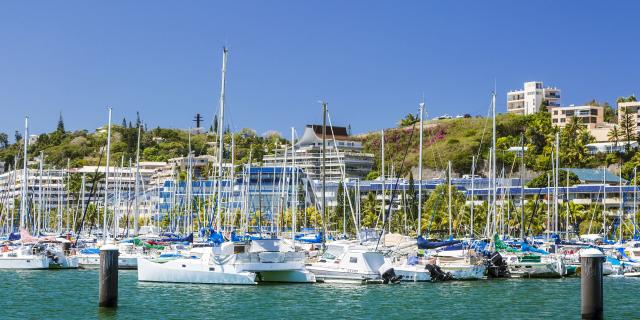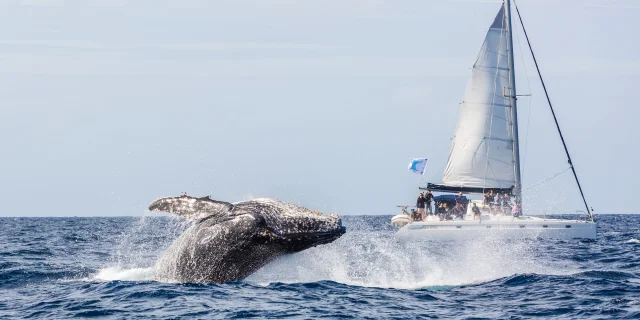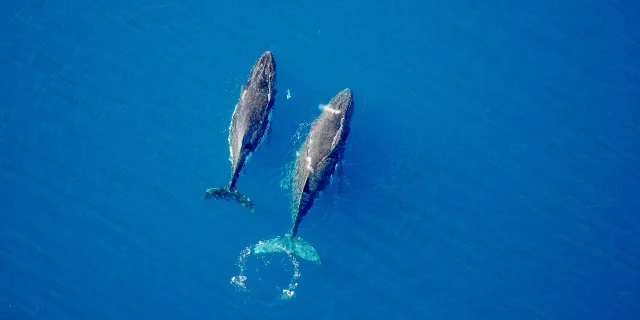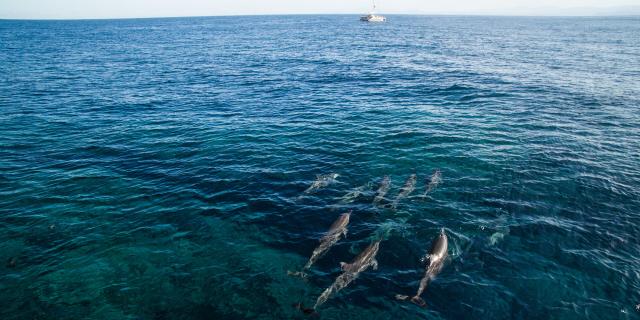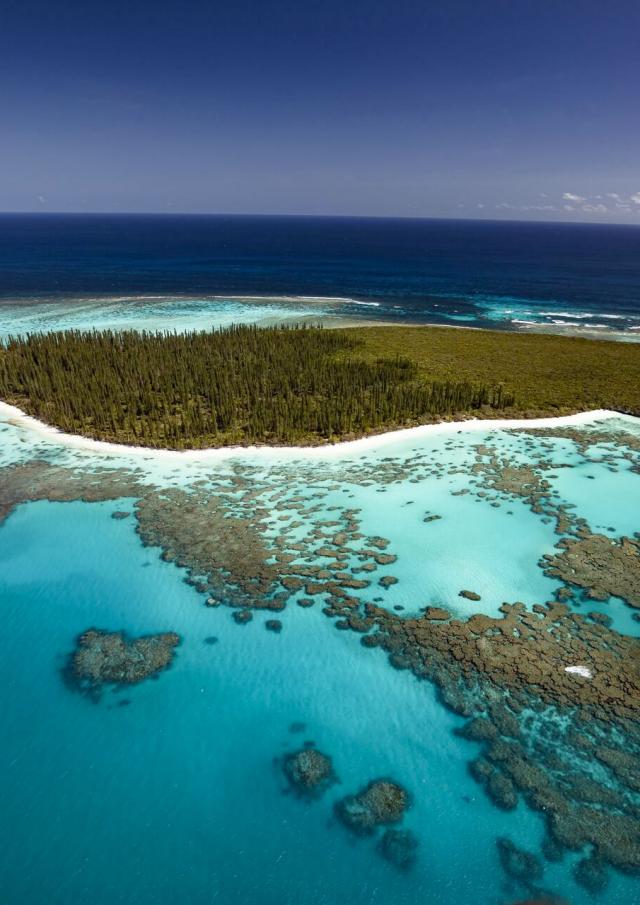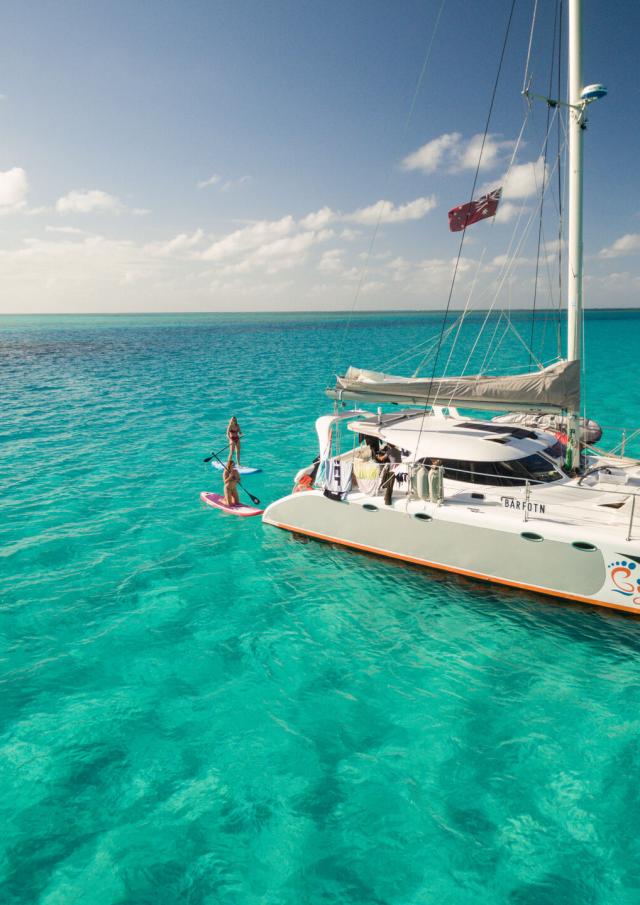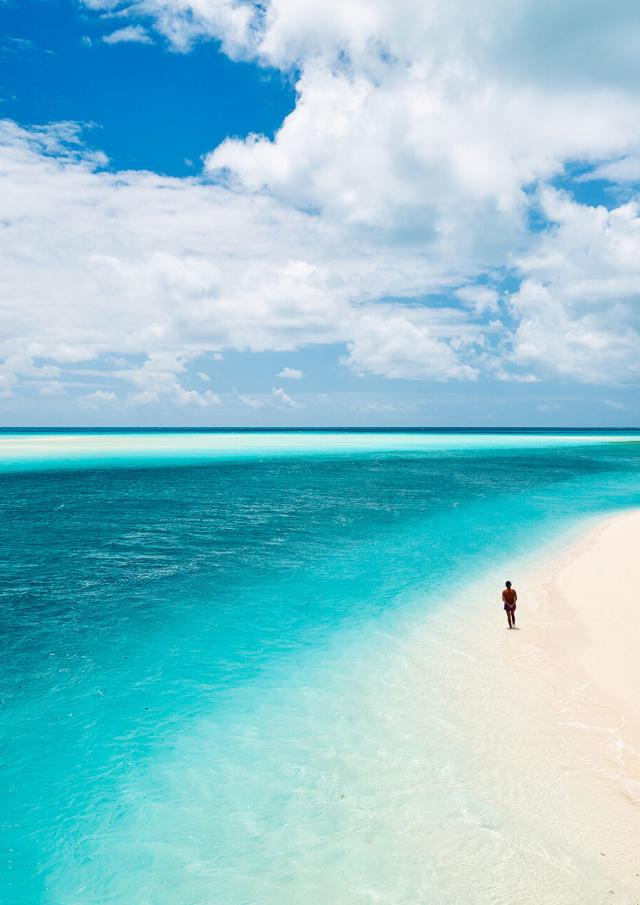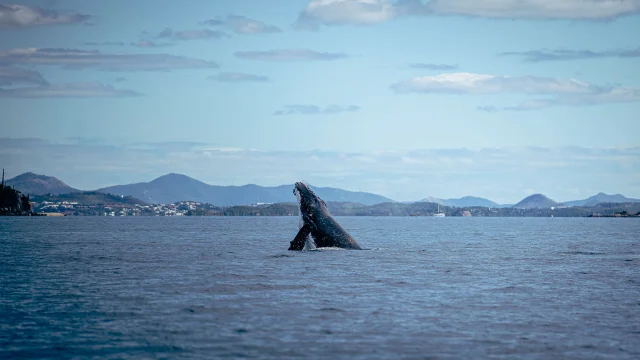 Whale Watching in New Caledonia
Whale Watching in New Caledonia Whale Watching in New Caledonia
Whale Watching in New CaledoniaWhale watching
New CaledoniaUnderstanding whale watching?
 Whale Watching in New Caledonia
Whale Watching in New CaledoniaThe humpback whale, an iconic species of the Coral Sea Natural Park, is among the largest creatures on Earth. Recognisable by their black bodies and long pectoral fins underneath, humpback whales embark on an extraordinary journey from mid-July to mid-September. They travel over 8,000 kilometres from Antarctica to the warm waters of New Caledonia’s lagoon for breeding and calving, before their return to sub-Antarctic feeding grounds. The season typically starts with females, followed by older and younger individuals, and eventually, males. Whale watching allows you to observe them without causing any disturbance, primarily from boats, but also from a few designated observation points on land.
And witness their leaps in the distance, my heart melts as if I’ve just uncovered the ocean’s greatest secret. I experience this spectacle every year during the humpback whales’ mating season in the refreshing 23-degree coolness of the Caledonian lagoon.
Where to observe whales in New Caledonia?
In NouméaYou might be fortunate enough to spot mothers and calves passing close to Nouméa, either from the mainland or while taking a water cab to islets near the capital, such as Phare Amédée. To enhance your chances of encountering these magnificent creatures, consider joining a day cruise in the southern part of Grande Terre departing from Port Moselle. Alternatively, you can rent a catamaran for an extended cruise spanning several days, optimising your whale watching opportunities.
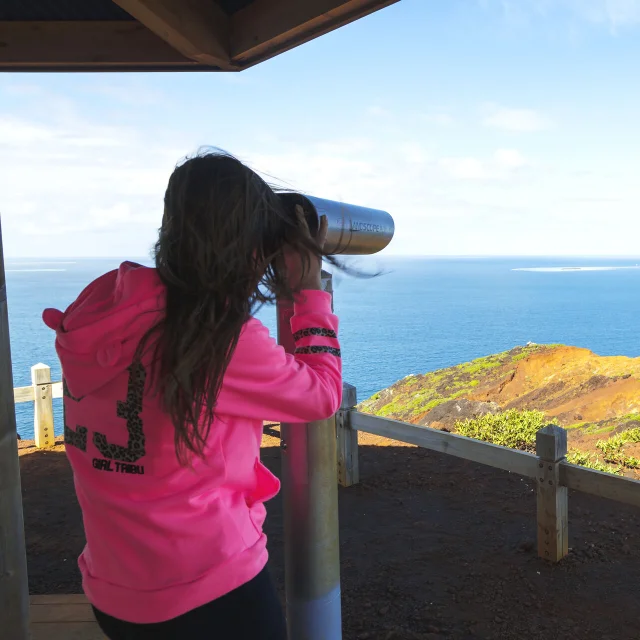 Whale watching center of Cap N'Dua
Whale watching center of Cap N'DuaThe sheltered bays of the Great South are well-known as prime whale-watching locations. Join specialist operators on a guided day trip to witness humpback whales. These curious creatures might treat you to an unforgettable display, including somersaults and striking their caudal or pectoral fins. If you prefer to stay on land, head to Cap N’Dua, a two-hour drive from Nouméa, to learn about and observe whales from the shoreline. The site features an observation centre equipped with binoculars and informational panels for visitors.
Humpback whales measure around 14 metres and weigh an average of 30 tons.
Whale watching service providers
In the Islands
 Cliffs of Jokin, Lifou
Cliffs of Jokin, LifouHumpback whales often pass along the jagged coasts off the Loyalty Islands or the Isle of Pines, making it possible to observe them from the beach, the shoreline, on walks that offer beautiful viewpoints or even by chance on a sea outing. From the cliffs of Jokin in Lifou or the terraces of Shabadran in Maré, watch for the breath of the humpback whale on the horizon.
- How can I see whales in New Caledonia?
Whale watching is closely regulated in New Caledonia to ensure the protection of these animals. To catch a glimpse of them, you have several options: book a spot on a sailing or motor boat, rent one, or visit designated land-based observation points in Nouméa and the Great South. While sightings from boats are more common, they are not guaranteed. On land, patience is required, allowing you to enjoy a picnic amid the beautiful surroundings.
For boat excursions, the Nouméa Tourist Office provides advice and consolidates information about whale-watching outings. Most service providers have signed the Cetacean Watching Charter and received educational training to ensure a respectful and enjoyable experience while protecting the animals.
- What to see on a whale watching trip?
The humpback whales you’ll encounter belong to the baleen whale subspecies (mysticetes). They measure approximately 15 metres in length and weigh between 30 to 40 tons. These magnificent creatures boast large pectoral fins, with a grey back and black or white belly. With the naked eye or binoculars, you can observe various behaviours, including leaping, tapping their caudal or pectoral fins on the water, poking their heads out of the water in a “spy” position, and displaying their rounded backs as they probe the seabed.
Good to know: Boats maintain a considerable distance to avoid disturbing them. However, these ocean giants have a mind of their own and can be quite curious, sometimes approaching boats closely, providing a delightful experience. One whale may extend its enormous flipper as if to greet you, while another, accompanied by her calf, observes from a distance—a truly unpredictable spectacle where nature decides what to reveal.
- What are the rules of observation?
Whale watching in New Caledonia is governed by environmental codes to ensure the safety and well-being of the animals.
Observers must adhere to specific rules, including:
- maintaining a distance of at least 100 metres from the whales,
- approaching neither from behind nor in front of the whale or group,
- refraining from chasing the whales,
- avoiding actions that may obstruct their movement,
- not observing calves (those less than 8 metres in length) or groups with calves,
- and limiting observation to a maximum of one hour continuously per boat and per group of whales.
Crossings of whale groups are strictly prohibited, and boats must maintain an approach speed not exceeding 3 knots of the animal’s speed.

